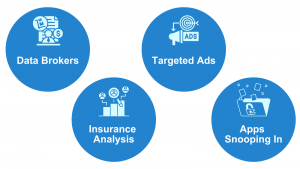In our fast-paced world, where everything seems quick and easy, we’re facing a big question about privacy. With so many free apps and services out there, it makes you wonder: what’s the catch? These free options are tempting, but they might cost us more than we realize, especially when it comes to our personal information. Are we accidentally giving away more than we bargained for? Let’s dive into the world of free digital services and figure out what’s really going on with our data. It’s time to take a closer look at what it means when something is offered for free and how it affects our privacy. Join us as we untangle the web of free services and the price we pay without even knowing it.
The Dilemma: Balancing Convenience and Data Privacy
The word freemium is derived from the terms “free” and “premium,” It is a business model in which consumers are given essential parts of a product or service for free. Freemium products or services provide a basic version of their services for free, with the ability to upgrade to a “Pro” version that contains advanced functions and features in exchange for a certain fee.
Using this freemium model, companies create the first connections with clients by providing free essential services, then charging them for advanced services, add-ons, increased storage, or use limitations. The paid versions usually add features like the ability to view or use premium content, cloud storage facilities, meeting recording, ad-free experience, and more. Perks like extensive customer services and enhanced security features are also added benefits that can be obtained by purchasing a subscription. The freemium model works effectively for internet-based enterprises with low client acquisition costs but high lifetime value.
Not everyone may opt-in for the paid services and can choose to keep using the free version of the app for the minimal benefit the product provides. This model can be beneficial enough but can also put you and your privacy at risk.
While freemium products offer attractive benefits, users must recognize the underlying trade-off between convenience and data privacy. When opting for free services, it is essential to be aware that some companies may gather and analyze user data to fuel targeted advertising, personalize content, or even sell data to third parties. For users, this raises concerns about the extent to which their personal information is being shared, used, and potentially exploited. Striking the right balance between enjoying the convenience of freemium products and safeguarding one’s data privacy requires a conscious and informed approach.
As we navigate the digital landscape, understanding the intricacies of data privacy and the freemium model empowers us to make informed decisions about the services we use and the information we share. It is crucial to be vigilant, read privacy policies, and explore ways to safeguard our personal data while enjoying the benefits of the digital world.
The Use of Our Personal Data
All the information gathered by the platforms may be used to predict who you are, what demographics you fit into, what additional products or services you would be interested in, and more.
We’re all used to submitting our information on the internet and then moving on without considering it. However, when we enter data on a shopping site or provide our email provider with our name, address, or phone number, that information is frequently stored—indefinitely. Most websites that save your information won’t do anything with it unless you permit them. However, certain websites with weak security and unprotected data may become hacker targets. The moral of the story is to be cautious about what you disclose online since you never know where it may end up.

Here are a few ways our data is being used:
Data Brokers
Your data is probably even more important than you think. In reality, an entire market is built on the purchase and sale of your internet data. Data brokers acquire and sell your online data, which includes everything from your name and address to your income and general internet behavior.
Targeted ADs
Websites and platforms track everything you browse to create a unique advertising experience for you. Websites collect your data to develop a profile of your interests based on the topics you search for, the websites you visit, the links you “like” on social media, and so on. Advertisers can create targeted ads according to the Target Audience Profile they produce using the data they acquire from what we share.
Insurance Analysis
Insurance companies, like advertising, have been known to buy and analyze our data to establish rates and premiums. Some organizations would go so far as to snoop on a customer’s social media profiles to validate or refute accusations.
Apps Snooping In
If you have a smartphone, there’s a strong probability you’re unknowingly exchanging data. Many mobile phone applications track our movements while we are not actively using them. Location data is recorded not just by location-based apps like maps but also by games, social networking apps, and even utilities like flashlights.
Do the Benefits Outweigh the Negatives?
There is no doubt that communication platforms, streaming platforms, and digital libraries are incredibly beneficial for almost every industry, institution, and entity. Let us take video conferencing platforms as a reference.
Video or virtual conferencing platforms have helped bring the world closer and omitted barriers while minimizing traveling costs for physical meetings or discussions. Video conferencing has made collaboration more accessible and convenient with features like file sharing, polls, and whiteboard, just to name a few.
Along with the many benefits that video conferencing platforms provide, they also come with many security flaws. Data Privacy is one of the most crucial security flaws and is the umbrella factor in play on the other security issues. There is a risk of data theft and breaches, meeting hijackings, access to secret meeting recordings, leak of confidential business information or intellectual property, and more.
Is There Any Safer Alternative?
It may be challenging to trust how the companies managing the platforms handle our data; few companies have stepped up. Spotify, for example, tells us the purpose and need of the ads in their ads while trying to be as transparent as possible. Canva, on the other hand, is entirely on the cloud and requires very minimal information from us while also providing a vast array of services for free.
With the hit of the COVID pandemic, virtual conferencing platforms became ever more popular. But with the popularity and rise in the number of users came news of security loopholes and data mishandling. A relatively new but revolutionary platform, Convay, has won the public’s trust as they state their lack of need to share user data. Convay has released a statement saying that “holding on to our users’ data and keeping them secured holds the highest priority.”
Key Takeaway
Therefore, whenever any product is offered to be free, we must remember that we may be the product ourselves. We should remind ourselves that our personal information is much more valuable than we think. Whenever we opt-in for any freemium product, or any product in general, we need to read the terms & conditions it entails. We must always be aware of what data we share beforehand with an entity and not regret it afterward.
